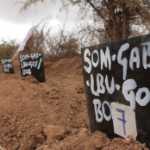Araweelo News Network
To much of the world, Somalia has a fearsome reputation. It is seen as one of the most dangerous places on the planet – a failed state that is widely believed to be home to warlords, pirates and terrorists.
To much of the world, Somalia has a fearsome reputation. It is seen as one of the most dangerous places on the planet – a failed state that is widely believed to be home to warlords, pirates and terrorists.
But in the north of the country, at least, the reality is different.
Somaliland is an autonomous enclave with its own flourishing capital city, Hargeisa. Though a long way off from receiving international recognition as an independent state, it is a haven of peace and stability when compared with the rest of Somalia.
But Somaliland has its dark side. Within living memory its citizens fell victim to the most savage of state-sponsored atrocities. General Siad Barre – the ruthless dictator who ruled Somalia from 1969 to 1991 – went to war with the clans who inhabited the area. Believing them to be supporting a rebellion against his regime, he took revenge by sending in his army with a mandate to “kill all but the crows”.
The city of Hargeisa was virtually destroyed during intense and pitiless bombardment. Many thousands of people were killed or driven into exile. Barre’s soldiers, meanwhile, tortured and murdered as many as 50,000 others – most of them civilians – and buried their bodies in mass graves. Now, as those who still live in this region try to secure their future, some feel those past agonies should be re-examined and those responsible held to account.
In this exclusive two-part investigation, People and Power meets a community coming to terms with the horrors of the past and joins forces with a group of forensic investigators and human rights activists attempting to bring an alleged war criminal, Yusuf Abdi Ali, also known as Colonel Tukeh, to account.
read more
This story from Al Jazeera was supplied to AllAfrica under an agreement with the African Media Agency.





